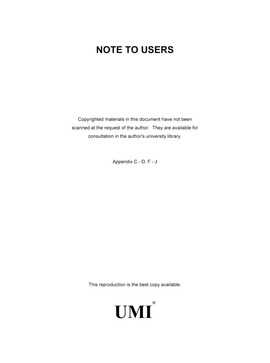| dc.contributor.advisor | Scherman, Avraham, | en_US |
| dc.contributor.author | Yamanaka, Momi. | en_US |
| dc.date.accessioned | 2013-08-16T12:19:25Z | |
| dc.date.available | 2013-08-16T12:19:25Z | |
| dc.date.issued | 2004 | en_US |
| dc.identifier.uri | https://hdl.handle.net/11244/736 | |
| dc.description.abstract | A convenient sample of (N = 233) Asians who were living in U.S. completed at least a portion of the survey. Use of harmony control was not a good predictor of Asians' either positive or negative well-being after controlling for the negative impact of discrimination experience. Identification with Asian culture, measured by SL-ASIA, had a statistically significant relationship with one of 5 harmony control subscales. | en_US |
| dc.description.abstract | Harmony control is a new type of control introduced by Morling and Fiske (1999) and brought a new explanation for people's perceivably unmotivated behaviors. In this web-based study, Asians' use of harmony control and it relationship with the acculturation level measured by the Suinn-Lew Asian Self Identity Acculturation Scale (SL-ASIA) and well-being (using 5 well-being measurements) were examined. | en_US |
| dc.format.extent | xi, 109 leaves ; | en_US |
| dc.subject | Psychology, Clinical. | en_US |
| dc.subject | Education, Guidance and Counseling. | en_US |
| dc.subject | Control (Psychology) | en_US |
| dc.subject | Education, Bilingual and Multicultural. | en_US |
| dc.subject | Psychological tests. | en_US |
| dc.subject | Acculturation Research. | en_US |
| dc.title | Relationships between use of harmony control, acculturation, and subjective well-being among Asians in the United States. | en_US |
| dc.type | Thesis | en_US |
| dc.thesis.degree | Ph.D. | en_US |
| dc.thesis.degreeDiscipline | Department of Educational Psychology | en_US |
| dc.note | Adviser: Avraham Scherman. | en_US |
| dc.note | Source: Dissertation Abstracts International, Volume: 65-04, Section: A, page: 1268. | en_US |
| ou.identifier | (UMI)AAI3127802 | en_US |
| ou.group | Jeannine Rainbolt College of Education::Department of Educational Psychology | |
